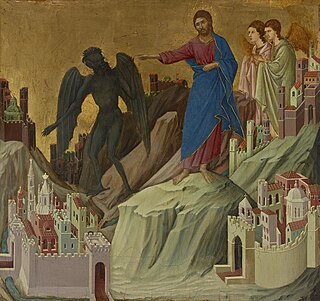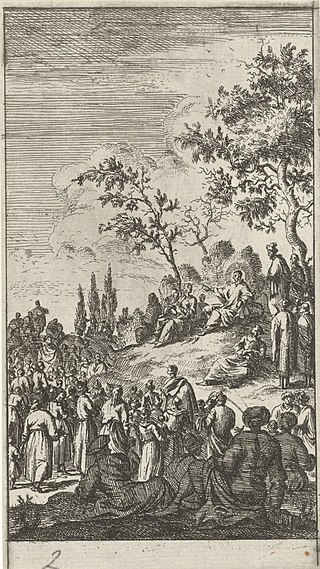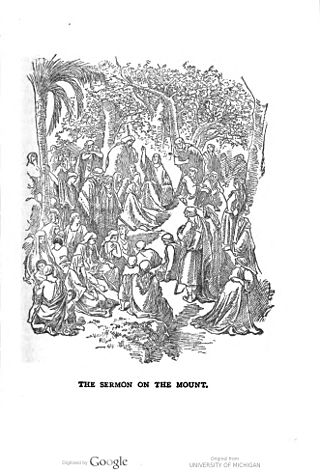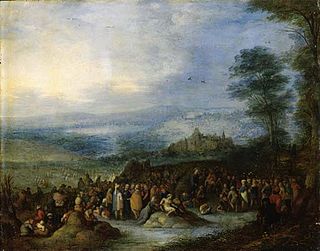
The Gospel of Matthew is the first book of the New Testament of the Bible and one of the three synoptic Gospels. It tells how Israel's Messiah, Jesus, comes to his people but is rejected by them and how, after his resurrection, he sends the disciples to the gentiles instead. Matthew wishes to emphasize that the Jewish tradition should not be lost in a church that was increasingly becoming gentile. The gospel reflects the struggles and conflicts between the evangelist's community and the other Jews, particularly with its sharp criticism of the scribes and Pharisees with the position that through their rejection of Christ, the Kingdom of God has been taken away from them and given instead to the church.

Matthew 4:8 is the eighth verse of the fourth chapter of the Gospel of Matthew in the New Testament. Jesus has just rejected Satan's second temptation. In this verse the devil transports Jesus to a new location for the third temptation.

Matthew 5:1 and Matthew 5:2 are the first two verses of the fifth chapter of the Gospel of Matthew in the New Testament. The verses introduce the Sermon on the Mount that will be recited in the next several chapters. The previous chapter concluded with large crowds "from Galilee, and from the Decapolis, Jerusalem, Judea, and beyond the Jordan" who followed Jesus to witness him healing: these verses present Jesus as seeing the crowds and going up onto a mountain to begin teaching.

Matthew 5:20 is the twentieth verse of the fifth chapter of the Gospel of Matthew in the New Testament and is part of the Sermon on the Mount. Jesus has reported that he came not to destroy the law, but fulfill it. But in this verse, he makes clear that the common understanding of the Law is not enough.

Matthew 5:44, the forty-fourth verse in the fifth chapter of the Gospel of Matthew in the New Testament, also found in Luke 6:27–36, is part of the Sermon on the Mount. This is the second verse of the final antithesis, that on the commandment to "Love thy neighbour as thyself". In the chapter, Jesus refutes the teaching of some that one should "hate [one's] enemies".

Matthew 6:2 is the second verse of the sixth chapter of the Gospel of Matthew in the New Testament and is part of the Sermon on the Mount. This verse continues the discussion of how even good deeds can be done for the wrong reasons.

Matthew 6:5 is the fifth verse of the sixth chapter of the Gospel of Matthew in the New Testament and is part of the Sermon on the Mount. This verse opens discussion on the proper procedure for praying.

Matthew 6:7 is the seventh verse of the sixth chapter of the Gospel of Matthew in the New Testament and is part of the Sermon on the Mount. This verse continues the discussion on the proper procedure for praying.

Matthew 7:16 is the sixteenth verse of the seventh chapter of the Gospel of Matthew in the New Testament and is part of the Sermon on the Mount. This verse continues the section warning against false prophets.

Matthew 23 is the twenty-third chapter in the Gospel of Matthew in the New Testament section of the Christian Bible, and consists almost entirely of the accusations of Jesus against the Pharisees. The chapter is also known as the Woes of the Pharisees or the "Seven Woes". In this chapter, Jesus accuses the Pharisees of hypocrisy. Some writers treat it as part of the final discourse of Matthew's gospel.
Matthew 16 is the sixteenth chapter in the Gospel of Matthew in the New Testament section of the Christian Bible. Jesus begins a journey to Jerusalem from the vicinity of Caesarea Philippi, near the southwestern base of Mount Hermon. Verse 24 speaks of his disciples "following him".

Matthew 19 is the nineteenth chapter in the Gospel of Matthew in the New Testament section of the Christian Bible. The book containing this chapter is anonymous, but early Christian tradition uniformly affirmed that Matthew composed this Gospel. Jesus commences his final journey to Jerusalem in this chapter, ministering through Perea. It can be seen as the starting point for the passion narrative.

Matthew 22 is the twenty-second chapter in the Gospel of Matthew in the New Testament section of the Christian Bible. Jesus continues his final ministry in Jerusalem before his Passion. Teaching in the Temple, Jesus enters into debate successively with the Pharisees, allied with the Herodians, the Sadducees, and a lawyer, ultimately silencing them all.
John 7 is the seventh chapter of the Gospel of John in the New Testament of the Christian Bible. It recounts Jesus' visit to Jerusalem for the feast of Tabernacles, the possibility of his arrest and debate as to whether he is the Messiah. The author of the book containing this chapter is anonymous, but early Christian tradition uniformly affirmed that John composed this Gospel. Alfred Plummer, in the Cambridge Bible for Schools and Colleges, describes this chapter as "very important for the estimate of the fourth Gospel. In it the scene of the Messianic crisis shifts from Galilee to Jerusalem; and, as we should naturally expect, the crisis itself becomes hotter. The divisions, the doubts, the hopes, the jealousies, and the casuistry of the Jews are vividly portrayed." John 7:1 to 8:59 is sometimes referred to as the "Tabernacles Discourse". Raymond E. Brown describes the Tabernacles Discourse as "a polemic collection of what Jesus said in replies to attacks by the Jewish authorities on his claims".

Luke 6 is the sixth chapter of the Gospel of Luke in the New Testament of the Christian Bible, traditionally attributed to Luke the Evangelist, a companion of Paul the Apostle on his missionary journeys. Jesus' teaching about the Sabbath enrages the religious authorities and deepens their conflict. The selection of twelve apostles is recounted and this is followed by the "Sermon on the Plain", where key aspects of Jesus' teaching are presented.
Luke 20 is the twentieth chapter of the Gospel of Luke in the New Testament of the Christian Bible. It records the teaching of Jesus Christ in the temple in Jerusalem, especially his responses to questions raised by the Pharisees and Sadducees. The book containing this chapter is anonymous, but early Christian tradition uniformly affirmed that Luke the Evangelist composed this Gospel as well as the Acts of the Apostles.

Matthew 7:21 is the twenty-first verse of the seventh chapter of the Gospel of Matthew in the New Testament and is part of the Sermon on the Mount. This verse continues Jesus' warning against false prophets.

Matthew 7:28 is the twenty-eighth verse of the seventh chapter of the Gospel of Matthew in the New Testament. It forms the first part of a two verse conclusion following the Sermon on the Mount.

Matthew 8:1 is the first verse of the eighth chapter of the Gospel of Matthew in the New Testament. The Sermon on the Mount has been concluded in the previous chapter and this verse opens a section focusing on Jesus' miracles, which continue into Matthew 9.

Matthew 15:2 is a verse in the fifteenth chapter of the Gospel of Matthew in the New Testament.

















